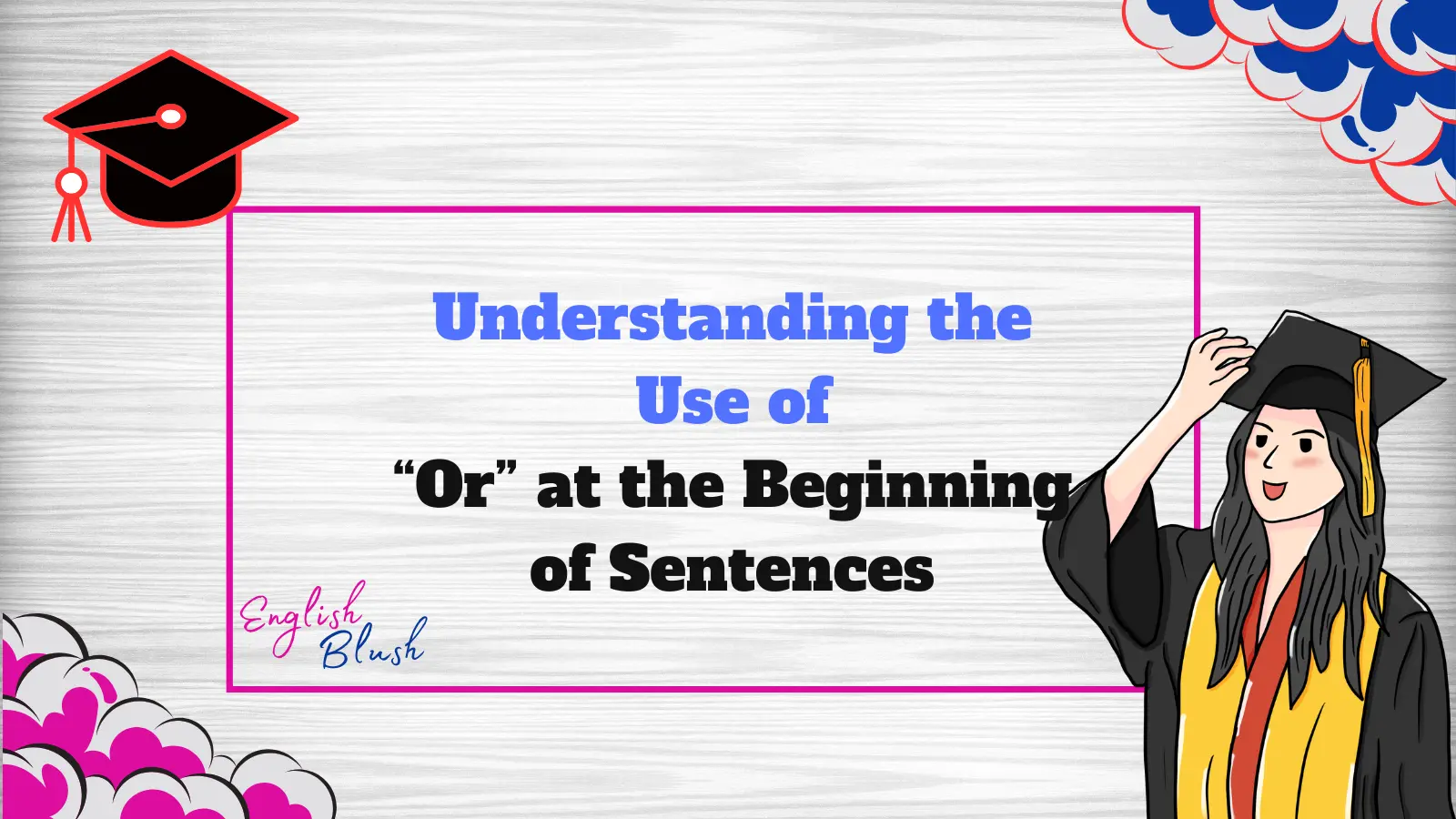“Or” is a powerful conjunction used to present alternatives or choices. While we’re used to seeing “or” connecting clauses within a sentence, there’s a common question about starting a sentence with this word. Is it correct? Does it sound formal or informal? In this article, we’ll explore these questions and clarify when it’s appropriate to begin a sentence with “or.”
Can You Start a Sentence With “Or”?
It’s common advice to avoid beginning sentences with conjunctions like “and” or “but,” but starting with “or” isn’t inherently wrong. In fact, writers and speakers often start sentences with “or” for different reasons, whether they are trying to simplify their ideas, present alternatives, or make their writing flow better.
Starting a sentence with “or” is grammatically correct and can serve several purposes. Let’s break these down.
The Function of “Or” at the Start of a Sentence
Presenting Alternatives
The primary role of “or” is to offer choices. It acts as a bridge between options. When you begin a sentence with “or,” you often present an alternative or something different from what was mentioned earlier. In writing, this is commonly used to emphasize your point or offer different possibilities.
Example:
- You could visit the museum tomorrow. Or, you could join the nature walk if you prefer being outdoors.
In this example, starting with “or” draws attention to the second option, putting it on equal footing with the previous one.
Adding Emphasis or Drama
In informal writing or speaking, beginning a sentence with “or” can add a sense of urgency, drama, or even humor. It can make the reader feel that there’s an important choice to be made. In certain contexts, it can add impact or create a stylistic break in the narrative.
Example:
- Hurry up! Or we’ll miss the movie!
Here, “or” creates an immediate consequence, enhancing the urgency of the situation.
When to Use “Or” in Formal Contexts
While starting a sentence with “or” is acceptable, the context matters. It’s more common in informal or casual writing. However, it can also appear in formal contexts, such as academic writing, though it should be done carefully.
In Academic Writing
Starting sentences with “or” in academic papers or professional reports can be useful, but it’s important to stay clear and logical. If the alternatives presented are part of a well-structured argument, the use of “or” helps maintain coherence.
Example:
- The data supports the theory of climate change. Or, it could be an anomaly in the results.
While this is formal in tone, it introduces an alternative without sounding overly casual.
In Professional Emails or Documents
When writing professional emails or documents, starting sentences with “or” can also work. It often serves the purpose of suggesting options or providing an alternative to a proposed action or idea.
Example:
- You can review the proposal this afternoon. Or, if that’s not convenient, we can meet tomorrow.
Again, this use helps soften the suggestion and keeps the tone conversational yet professional.
Alternatives to Starting with “Or”
Even though “or” can be a useful sentence starter, there are alternatives to avoid overuse. If you want to vary your writing or sound more sophisticated, you can start sentences in different ways.
Using “Alternatively”
“Alternatively” can often replace “or” at the beginning of a sentence. It sounds slightly more formal and can be used in both casual and professional settings.
Example:
- You could consider applying for the internship. Alternatively, you could look for similar opportunities in other industries.
This example still offers a choice, but using “alternatively” makes the tone slightly more formal and polished.
Using “Another Option is”
Another alternative phrase is “another option is.” This starts a sentence with a similar effect but avoids repetition of “or.”
Example:
- The first approach could be more efficient. Another option is to work on the long-term solution immediately.
Here, the idea is still about providing options but offers a more structured approach to presenting alternatives.
Using “You Could Also”
For a less formal option, using “you could also” can serve as a smooth way to suggest alternatives without starting with “or.”
Example:
- We could go to the beach today. You could also consider visiting the local park, if you’d like a change.
This is a simple way to start a sentence that makes the options feel friendly and casual.
Formal and Informal Contexts: When to Use “Or”
Understanding whether to use “or” at the beginning of a sentence often depends on the type of writing or communication. Let’s break it down.
In Informal Contexts
Starting a sentence with “or” is more common in informal contexts like personal emails, blog posts, conversations, or social media. It gives your writing a casual feel and allows for more flexible, conversational tone.
For example, blog posts, text messages, or casual emails might make use of “or” as an effective tool to quickly add choices:
- I think we should go to dinner early. Or, we can grab some drinks afterward.
In Formal Contexts
In more formal writing, like academic papers, business reports, or official correspondence, beginning a sentence with “or” might feel out of place if used frequently. Instead, you should be more mindful and vary your structure to avoid sounding too informal or fragmented.
For formal writing:
- The team could review the material by Monday. Alternatively, they can schedule a session for Tuesday.
Here, the tone remains professional and doesn’t come across as casual.
Overusing “Or” Can Weaken Your Writing
While starting with “or” can be useful, overusing it may weaken your message. It can make your writing sound too choppy or rushed. To avoid this, try balancing the use of “or” with other sentence structures to improve the flow.
For example:
- You can choose the red shirt. Or, the blue one works, too. Can be revised as:
- You have the option to choose the red shirt, though the blue one works, too.
This version avoids excessive use of “or” and maintains the structure, making it easier to read.
Conclusion
In conclusion, it’s perfectly fine to begin a sentence with “or,” especially when you want to present an alternative, add emphasis, or offer a choice. It’s crucial to consider the tone and context of your writing, whether it’s formal or informal. You should also vary your sentence structure and consider alternatives, such as “alternatively” or “another option is,” to avoid overusing “or” and enhance clarity.
With these insights, you can use “or” effectively to give your writing a smooth and natural flow while maintaining an appropriate tone for the context.





